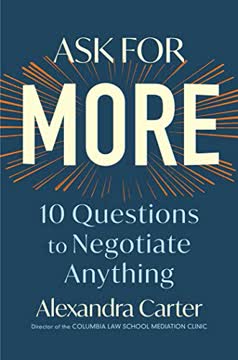Key Takeaways
1. Ask Open Questions to Uncover Hidden Value in Negotiations
"Tell me" is the most open question you can ask on any topic.
Cast a wide net. Open questions like "Tell me..." allow you to gather a wealth of information and establish a positive relationship with the person across the table. This approach helps you:
- Uncover the other party's true motivations and needs
- Gain a broader perspective on the situation
- Encourage the other person to share more openly
By asking open questions, you create an environment of trust and collaboration, setting the stage for more productive negotiations. Remember to follow up with "Tell me more..." to delve deeper into specific topics of interest.
2. Look in the Mirror: Understand Yourself Before Negotiating
Needs motivate everything we do. They are our driving forces, the why behind all human behavior.
Self-awareness is crucial. Before entering any negotiation, take time to reflect on your own motivations, needs, and emotions. This introspection helps you:
- Identify your true priorities and non-negotiables
- Recognize potential biases or emotional triggers
- Develop a clearer sense of your goals and aspirations
Use the "Mirror" questions to gain insight into yourself:
- What's the problem I want to solve?
- What do I need?
- What do I feel?
- How have I handled this successfully in the past?
- What's the first step?
By understanding yourself better, you'll be better equipped to navigate complex negotiations and advocate for your interests effectively.
3. Define Your Problem and Needs Clearly
Getting underneath someone's demands to figure out the needs driving them can help transform someone's ideas about a conflict and what to do with it.
Clarity is power. Clearly defining your problem and needs is essential for successful negotiations. This process involves:
- Identifying the core issue at hand
- Distinguishing between tangible and intangible needs
- Prioritizing your needs based on their importance
When defining your needs, consider both concrete outcomes (e.g., a specific salary increase) and abstract concepts (e.g., recognition, autonomy). Ask yourself, "What would that look like?" to make intangible needs more concrete and actionable.
By clearly articulating your problem and needs, you create a solid foundation for finding mutually beneficial solutions in negotiations.
4. Acknowledge and Harness Your Emotions in Negotiations
Feelings are facts.
Emotions matter. Recognizing and managing your emotions is crucial for effective negotiations. Instead of suppressing feelings, use them as valuable data:
- Identify your emotional state before and during negotiations
- Understand how emotions influence your decision-making
- Use emotional intelligence to build rapport with the other party
Be especially aware of the "Big Two" hidden emotions: guilt and fear. These often underlie surface-level emotions and can significantly impact negotiations if left unaddressed.
By acknowledging and harnessing your emotions, you can navigate negotiations more skillfully and create more authentic connections with your counterparts.
5. Learn from Past Successes to Build Confidence
Memory influences how we make decisions; it affects how we feel about the path ahead of us.
Build on your strengths. Reflecting on past successes can boost your confidence and provide valuable insights for current negotiations. To leverage your past experiences:
- Identify specific situations where you've successfully handled similar challenges
- Analyze the strategies and skills that contributed to your success
- Apply those lessons to your current negotiation
If you can't recall a directly relevant success, look for transferable skills or experiences from other areas of your life. This practice not only builds confidence but also helps you develop a repertoire of effective negotiation strategies.
6. Take the First Step: Focus on Actionable Solutions
One step at a time builds momentum.
Start small, think big. When faced with complex negotiations or seemingly insurmountable challenges, focus on taking the first step. This approach helps you:
- Break down large problems into manageable pieces
- Build momentum and confidence through small wins
- Create a clear path forward
When identifying the first step:
- Make it specific and actionable
- Ensure it aligns with your overall goals
- Choose something that can be accomplished relatively quickly
By focusing on concrete, achievable actions, you can overcome inertia and make progress even in challenging negotiations.
7. Open a Window: Understand the Other Party's Perspective
When people talk, listen completely. Most people never listen.
Empathy is key. To negotiate effectively, you must understand the other party's perspective. Use the "Window" questions to gain insight:
- Tell me...
- What do you need?
- What are your concerns?
- How have you handled this successfully in the past?
- What's the first step?
Active listening techniques:
- Give your full attention
- Avoid interrupting or jumping to conclusions
- Summarize and reflect back what you've heard
By truly understanding the other party's viewpoint, you can identify areas of common ground and develop solutions that address both parties' needs.
8. Address Concerns and Needs to Build Trust
Asking about someone's concerns is a great way of getting at their needs.
Create psychological safety. Addressing the other party's concerns and needs is crucial for building trust and finding mutually beneficial solutions. To do this effectively:
- Ask open-ended questions about their concerns
- Listen actively and empathetically
- Validate their feelings and experiences
Remember that concerns often stem from unmet needs. By identifying and addressing these underlying needs, you can often resolve surface-level conflicts more effectively.
Demonstrating that you understand and care about the other party's concerns creates a foundation of trust, making it easier to find creative solutions and reach agreements.
9. Leverage Past Successes of Others for Inspiration
Recalling a prior success acts as a power prime.
Learn from others' experiences. Asking about the other party's past successes can provide valuable insights and inspiration for your current negotiation. This approach:
- Helps the other party feel valued and respected
- Provides concrete examples of effective strategies
- Creates a positive, solution-focused mindset
When discussing past successes:
- Ask for specific details about what worked well
- Explore how those strategies might apply to the current situation
- Use the information to brainstorm creative solutions
By leveraging the collective wisdom of both parties, you increase the likelihood of finding innovative and mutually beneficial outcomes.
10. Collaborate on Next Steps for Mutual Gain
Asking people for their ideas in negotiation usually costs you nothing, and can benefit you greatly.
Co-create solutions. Involving the other party in developing next steps fosters a sense of ownership and commitment to the negotiated outcome. To collaborate effectively:
- Ask for their ideas on potential solutions
- Build on each other's suggestions
- Focus on finding win-win outcomes
Benefits of collaboration:
- Increases buy-in from all parties
- Generates more creative and diverse ideas
- Strengthens relationships for future negotiations
By approaching negotiations as a collaborative problem-solving exercise, you can create more sustainable agreements and build stronger long-term relationships with your negotiation partners.
Last updated:
FAQ
1. What is Ask for More: 10 Questions to Negotiate Anything by Alexandra Carter about?
- Negotiation through questions: The book teaches that effective negotiation is driven by asking open, insightful questions rather than making demands or arguments.
- Mirror and Window framework: Alexandra Carter introduces a two-part method—Mirror questions for self-reflection and Window questions for understanding others.
- Broader application: Negotiation is redefined as any conversation where you steer a relationship, making the book relevant for business, personal, and everyday situations.
- Practical tools and stories: Real-life examples and actionable strategies are provided to help readers apply the concepts in various contexts.
2. Why should I read Ask for More by Alexandra Carter?
- Builds self-awareness and empathy: The book helps readers understand their own needs and feelings, as well as those of others, leading to more authentic and effective negotiations.
- Applicable to everyone: Whether negotiating a raise, resolving a conflict, or improving relationships, the book’s approach is accessible to all, not just professionals.
- Expert insights: Alexandra Carter’s experience as a negotiation trainer and law professor ensures the advice is research-based and practical.
- Transforms negotiation mindset: It challenges the misconception that negotiation is about arguing, showing instead how questions can unlock value and strengthen relationships.
3. What are the key takeaways from Ask for More: 10 Questions to Negotiate Anything by Alexandra Carter?
- Lead with open questions: Asking open-ended questions uncovers deeper needs and creates more value than making demands.
- Self-reflection is essential: Starting with the Mirror questions builds confidence and clarity before engaging with others.
- Empathy drives results: Understanding the other party’s perspective through Window questions leads to better outcomes and stronger connections.
- Negotiation is ongoing: It’s a continuous process of steering relationships, not just a one-time event focused on outcomes.
4. What is the Mirror and Window method in Ask for More by Alexandra Carter?
- Mirror questions: The first five questions focus on self-reflection—clarifying your problem, needs, feelings, past successes, and first steps.
- Window questions: The next five questions help you understand the other person’s perspective, needs, concerns, prior successes, and ideas for moving forward.
- Dual approach: Using both sets of questions increases clarity, empathy, and the likelihood of finding mutually beneficial solutions.
- Builds trust and creativity: This method expands the negotiation possibilities and fosters stronger, more collaborative relationships.
5. How does Alexandra Carter define negotiation as “steering a relationship” in Ask for More?
- Metaphor of kayaking: Negotiation is likened to steering a kayak, requiring ongoing attention and adjustment to external forces.
- Continuous process: Rather than isolated events, negotiation is seen as a series of conversations where you guide relationships toward your goals.
- Information is key: Just as a kayaker watches the waves, negotiators must gather information through questions and listening.
- Beyond transactions: This perspective broadens negotiation to include all interactions where you influence outcomes and relationships.
6. How does Ask for More by Alexandra Carter differentiate between open and closed questions in negotiation?
- Closed questions limit responses: These typically invite yes/no or one-word answers, restricting the flow of information.
- Open questions invite detail: Open-ended questions encourage broad, insightful responses, revealing feelings, facts, and perspectives.
- “Tell me…” as a model: The book highlights “Tell me…” as the most open and effective way to start a negotiation conversation.
- Unlocking hidden value: Using open questions is central to Carter’s framework for creating value in negotiations.
7. What are the Mirror questions in Ask for More by Alexandra Carter and why are they important?
- Foundation of self-reflection: The Mirror questions help you clarify your problem, needs, feelings, past successes, and first steps before negotiating.
- Builds internal self-awareness: Understanding your own priorities and emotions is critical for effective negotiation and leadership.
- Prepares for negotiation: Answering these questions gives you confidence, purpose, and actionable ideas.
- Examples include: “What’s the problem I want to solve?” and “What do I need?” to define your goals and motivations.
8. What are the Window questions in Ask for More by Alexandra Carter and how do they improve negotiation outcomes?
- Understanding others: The Window questions help you see the other person’s perspective, needs, feelings, and goals.
- Improves listening skills: The book emphasizes truly listening, not just preparing your response, as essential to effective negotiation.
- Builds connection and trust: Asking open questions and listening empathetically can transform adversarial relationships into partnerships.
- Foundation for value creation: These questions expand the information available, enabling creative solutions and stronger agreements.
9. How does Ask for More by Alexandra Carter recommend using “Tell me…” and follow-up questions in negotiation?
- Start broad: “Tell me…” is the ultimate open question, inviting the other person to share their perspective and relevant details.
- Embrace silence: After asking, wait patiently and resist the urge to fill the silence or narrow the focus.
- Follow up with “Tell me more…”: This keeps the conversation open and allows for deeper exploration of important topics.
- Builds rapport and trust: Open follow-ups encourage honesty and richer dialogue, leading to better negotiation outcomes.
10. What role do feelings and concerns play in negotiation according to Ask for More by Alexandra Carter?
- Feelings influence decisions: Emotions like fear, anxiety, anger, and guilt significantly impact negotiation behavior and outcomes.
- Acknowledge and address emotions: Recognizing and discussing feelings can prevent misunderstandings and build connection.
- Ask about concerns: Instead of directly asking about feelings, use “What are your concerns?” to invite safe and open sharing.
- Transform emotions into action: Both positive and negative feelings can be harnessed to boost creativity and motivation or to identify actionable steps.
11. How does reflecting on past successes help in negotiation as explained in Ask for More by Alexandra Carter?
- Builds confidence: Remembering prior negotiation successes reduces anxiety and self-doubt, putting you in a positive mindset.
- Generates strategies: Reflecting on what worked before provides practical ideas for current negotiations.
- Power priming: This psychological effect boosts motivation and performance, as supported by research.
- Expands options: Even with adversaries, recalling successes can open dialogue and foster collaboration.
12. What is the significance of asking “What’s the first step?” in negotiation according to Ask for More by Alexandra Carter?
- Builds momentum: Focusing on the first actionable step prevents overwhelm and helps you start moving forward.
- Encourages realistic planning: Taking one step at a time allows for adjustments and learning, increasing the chance of long-term success.
- Empowers both parties: Inviting the other person to suggest the first step fosters partnership and shared purpose.
- Manages complexity: Breaking negotiations into steps makes complex situations more manageable and less intimidating.
Review Summary
Ask for More receives overwhelmingly positive reviews, praised for its practical approach to negotiation in all aspects of life. Readers appreciate Carter's clear framework of "Mirror" and "Window" questions, finding it accessible and applicable. Many note the book's impact on their personal and professional relationships. Some criticize repetitiveness or lack of uniqueness, but most find valuable insights. The book is commended for its engaging style, real-life examples, and focus on self-reflection and understanding others, making negotiation less intimidating for many readers.
Similar Books
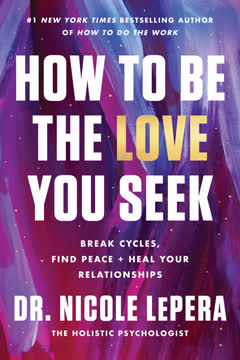


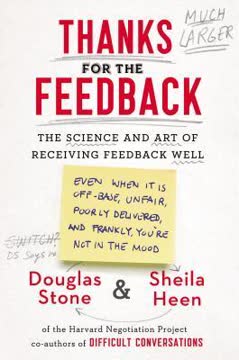



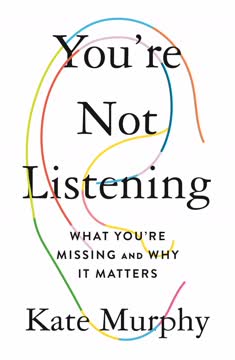
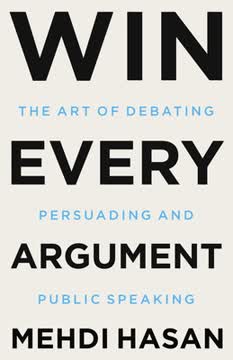
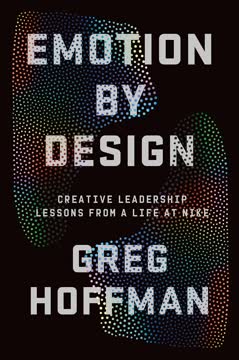
Download PDF
Download EPUB
.epub digital book format is ideal for reading ebooks on phones, tablets, and e-readers.
